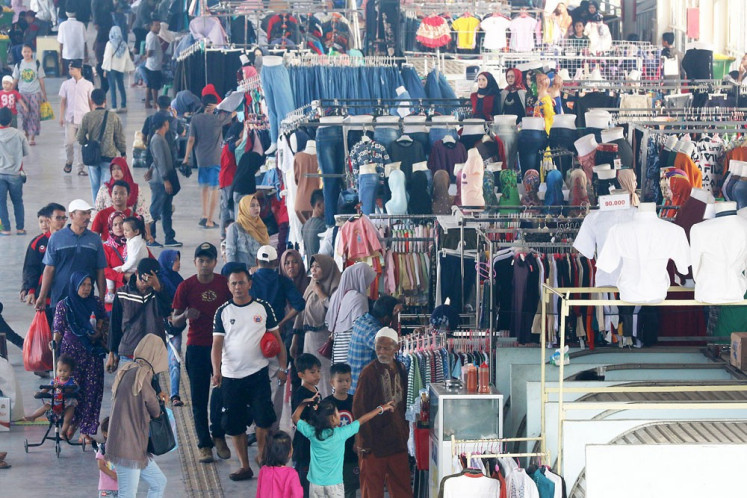Regulating peer-to-peer lending businesses
P2P lending businesses in Indonesia are not classified as banks or financing companies under prevailing laws and regulations.
Change text size
Gift Premium Articles
to Anyone
 P2P lending is the practice of lending money to individuals or businesses through online services that match lenders directly with borrowers. (Shutterstock/*)
P2P lending is the practice of lending money to individuals or businesses through online services that match lenders directly with borrowers. (Shutterstock/*)
A
long with the development of technology in Indonesia, the financial sector is also apparently progressing toward a more practical and modern outlook. One piece of evidence of the adjustment of the financial sector to technological developments is the emergence of peer-to-peer (P2P) lending businesses.
P2P lending is the practice of lending money to individuals or businesses through online services that match lenders directly with borrowers. The lending takes place online on P2P lending companies’ websites using various lending platforms and credit analysis tools. The borrower and the lenders do not meet physically and are often strangers.
Such businesses are growing and are having an impact on the Indonesian financial market. However, there are challenges for P2P lending companies trying to develop in Indonesia. The lack of underlying regulations can be considered one of the principal issues.
Some countries have taken regulatory responses to the development of P2P lending. Indonesia, however, has not provided any regulatory responses to the business, although it is becoming increasingly popular in the country.
In the financial industry, regulations are essential to ensure the delivery of consumer protection and a healthy financial system. Numerous countries’ policymakers are showing increasing eagerness to regulate the P2P lending sector. However, as striking the perfect regulatory balance is not easy, there are different approaches to regulate the business.
In the US, the largest P2P lending market, platforms must follow a difficult regulatory process. Each lender is required to be regulated by the Securities and Exchange Commission (SEC) and register the loans they originate.
These businesses receive the same treatment as public companies and as a consequence they have to comply with high disclosure requirements. In the UK, P2P lending platforms need approval from the Financial Conduct Authority (FCA) to operate. In Germany, P2P lending companies are obliged to acquire a banking license or partner with banks, which hinders the development of the industry.
Meanwhile, China requires P2P lending platforms to form a third-party depository system for customer funds with a “qualified banking institution”. In Singapore and South Korea, P2P lending platforms operate mostly outside of the regulators’ scope.
According to the above, it is justified to conclude that P2P lending regulatory responses in Indonesia resemble those in South Korea and Singapore. The businesses are neither legally classified as financial institutions nor governed by industry-specific rules.
As the government has not formulated any laws or regulations relating to the P2P lending business, it would be advisable to adopt the most suitable regulatory approaches from other countries.
These countries have been recognized as providing valuable experiences on how to handle P2P lending, including the costs and benefits of their regulatory approaches, which Indonesia could leverage.
P2P lending businesses in Indonesia are not classified as banks or financing companies under prevailing laws and regulations. Therefore, the German regulatory option, which obliges P2P lending companies to acquire a banking license, is not applicable in Indonesia.
Moreover, the obligation to partner with banks is also barely applicable given the fact that P2P lending platforms in Indonesia have entered into the market with a principal objective to disrupt and compete with prevailing financial businesses, and therefore such partnerships would not be deemed in accordance with this spirit.
Partnerships might be viewed as one option to foster the businesses, but may not be seen as a mandatory requirement in order to operate.
Meanwhile, under the US model, P2P lending platforms operate by filing full-blown registration statements with the SEC and registering the securities they offer to investors. P2P lending platforms file a “shelf registration statement”, which allows them to issue a maximum amount of securities.
Subsequently, P2P lending platforms need to file a prospectus supplement and take securities off the shelf every time they arrange a new loan. Given the legal hurdles involved, additional costs and ongoing reporting associated with public registration, this structure is too complex and would not be applicable in Indonesia. There must be also amendments to the law on capital markets as notes issued under the scheme are not classified as securities under Indonesia’s current capital market laws.
The UK response, on the other hand, provides a more streamlined approach. On April 1, 2014, the FCA regulated the lending platforms that were initially regulated by the Office of Fair Trading. This covered the responsibility for regulating loan-based crowdfunding platforms (the FCA Regulation).
The FCA Regulation was available to anticipate the risk of the business and balance the need for investor protection and economic health. Indonesia can therefore observe and duplicate some relevant points to be incorporated in the upcoming P2P lending regulations.
These include prudential standards, in which P2P lending firms should maintain regulatory capital in order to withstand future financial shocks, as well as protections in the event of the failure of P2P lending firms, where the existing loans must still be administered in order to avoid difficulty for investors.
Another is disclosure rules, which require P2P lending firms to ensure that investors have sufficient information to be able to make informed investment decisions and fulfil reporting requirements as P2P lending firms should submit regular reports to the FCA.
Meanwhile, China also shows relevant experience for the Indonesian government. The requirement to form a third-party depository system for customer funds with a qualified banking institution is a positive to be implemented. The custodian account acts as the fund transfer instrument between lenders and borrowers, and escrow, for all transactions between the parties.
By ensuring that all funding is conducted correctly, the escrow account is believed to increase the level of confidence of the lender in direct lending and borrowing activities. The circumstances in which P2P lending is not regulated under prevailing Indonesian regulations provides a legal loophole in establishing robust P2P lending business.
As such, the fact that the Financial Services Authority (OJK) is currently taking a proportionate approach to formulate specific regulations for P2P lending should be welcomed. Definite and clear regulations are critical as they help to strengthen investor confidence and avoid the mismanagement of any platform that could threaten the reputation and credibility of this very young industry. With no established rules in Indonesia for the P2P lending sector, operators have been trying to interpret the existing prevailing regulations.
The problem, however, is that not everyone interprets the rules in the same way. These industry players should be given clear directions to prevent them from operating under a veil of ambiguity.
***
The writer is studying international business law at Tilburg University, the Netherlands.
---------------
We are looking for information, opinions, and in-depth analysis from experts or scholars in a variety of fields. We choose articles based on facts or opinions about general news, as well as quality analysis and commentary about Indonesia or international events. Send your piece to community@jakpost.com.









